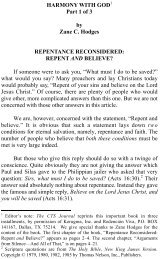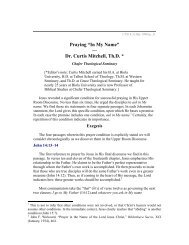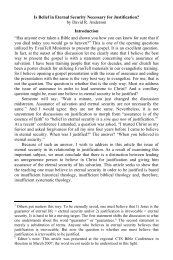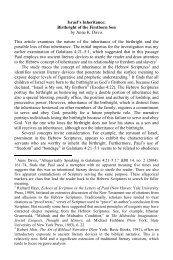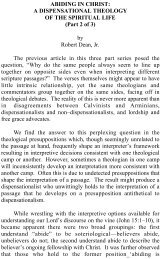HARMONY WITH GOD Part 3 of 3 by Zane C. Hodges - Chafer ...
HARMONY WITH GOD Part 3 of 3 by Zane C. Hodges - Chafer ...
HARMONY WITH GOD Part 3 of 3 by Zane C. Hodges - Chafer ...
Create successful ePaper yourself
Turn your PDF publications into a flip-book with our unique Google optimized e-Paper software.
Harmony with God 19<br />
exclusive claims <strong>of</strong> the Creator and <strong>of</strong> His Son, Jesus Christ.<br />
According to Paul, the God he proclaimed was the Judge <strong>of</strong> all the<br />
world. Thus a man’s eternal destiny was determined <strong>by</strong> the true<br />
and living God, not <strong>by</strong> any <strong>of</strong> the countless pagan deities that<br />
Athens honored with her idols.<br />
Thus Paul’s call for repentance from idolatry was intended to<br />
prepare his hearers to have dealings with the God who would<br />
“judge the world in righteousness.”<br />
Cornelius, as we have previously seen, 3 had already given up<br />
his idolatry before Peter came to his house. He was ready for<br />
Peter’s message. But where this readiness was not present—as it<br />
was not on the Areopagus—Paul’s message must lay the<br />
groundwork for that <strong>by</strong> challenging his hearers to turn to God from<br />
idols (see 1 Thess. 1:9).<br />
Let us remember here too that the speech recorded in Acts<br />
17:22–31 is the merest fragment <strong>of</strong> what Paul must have said on<br />
this occasion. That he must have mentioned faith in Christ is<br />
shown <strong>by</strong> the fact that some men joined him and believed (17:34;<br />
underlining added). But Luke’s purpose behind his record here is<br />
to show how Paul dealt with idolatry in the Gentile world. His<br />
purpose is not to give a complete account <strong>of</strong> all that Paul said.<br />
Clearly we see here how repentance can prepare the way for<br />
faith. It is no different than when an unsaved person turns in<br />
disgust from a sinful lifestyle and looks for a relationship with<br />
God. Repentance does not save him, but it prepares him to come to<br />
faith.<br />
Thus we can more accurately appreciate Paul’s summary <strong>of</strong><br />
his own preaching as the process <strong>of</strong> testifying to Jews, and also to<br />
Greeks, repentance toward God and faith toward our Lord Jesus<br />
Christ (Acts 20:21; underlining added; see also Acts 26:20). As<br />
3 See CTS Journal (October–December 2002): 52–54.



